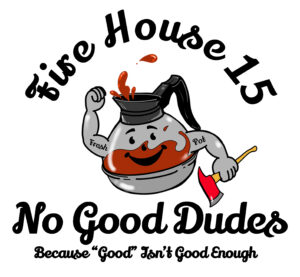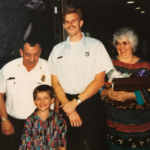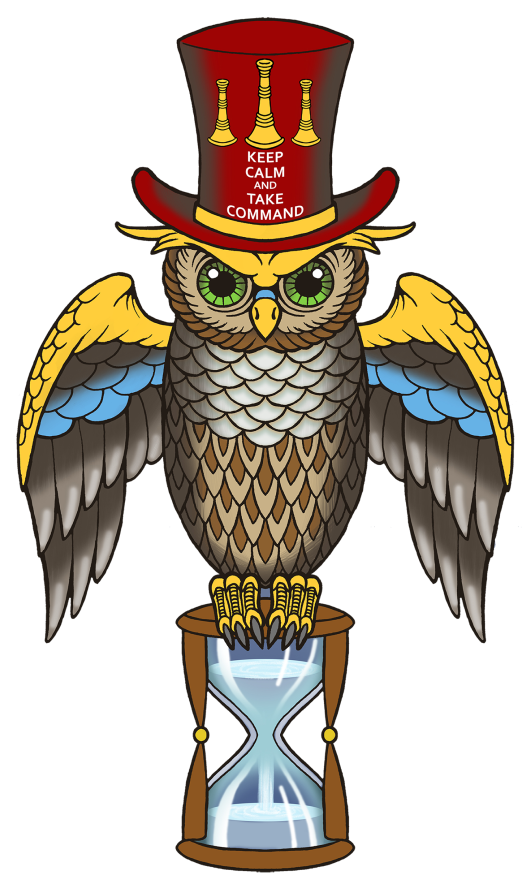NO MORE GOOD DUDES! A plague of very nice but highly incompetent leaders is plowing through the American Fire Service.
December 10, 2024NO MORE GOOD DUDES! A plague of very nice but highly incompetent leaders is plowing through the American Fire Service.
By Chris Stewart
B Shifter Buckslip, Dec. 10, 2024. First published Jan. 23, 2023.
I recently met with some firefighters and company officers to discuss training needs and build a plan to make it happen. Immediately after the meeting, someone from one of our west-side engine companies handed me a T-shirt. I expressed my appreciation and held it up to admire the artwork. I was struck by the words at the bottom, below the large, smiling coffee pot: “No good dudes!” I laughed out loud, feeling tremendous pride for Engine 15.

Historically, company shirts and emblems are creative forms of self-reflection—a bit of humor mixed with pride to represent our position in the community. I’ve always appreciated firefighters’ ability to capture the distinct personalities of where they work and with whom. Sometimes, the emblems feature the company or department’s mission statement; other times, they feature a maxim or satirical image representing the state of their department or community. But, more often than not, they hit the nail on the head.
On my drive home, glancing at my new fit, I began to ponder the deeper meaning of the phrase “good dudes.” I am freakishly sick of “good dudes,” as there is an epidemic of good dudes infecting the American Fire Service. On the surface, that seems like a really dumb thing to say. Let me explain.
A good dude is a person (male or female—I support equity and inclusion in all things) who moves into a leadership role without the merit or skills to perform the job and manage others well. When good dudes escape the grind and land a leadership position, they tend to surround themselves with other self-serving good dudes, which creates a cycle of fake hustle. Good dudes find a way to avoid legitimate work and instead focus on minutia and fringe issues, demonstrating a counterfeit performance of caring and competence. They look shiny on the outside, but these ponds are a mile wide and an inch deep.
Fundamentally, they cause many of the challenges we face in the fire service: customer service, fireground competence, incident command, safety and resources. Good dudes often lack the experience and humility necessary to lead others and inspire respect. Some good dudes never did the work; they merely witnessed others doing it or, worse, got in the way. Good dudes rarely get things done for Mrs. Smith or the firefighters.
How to Spot a Good Dude
Most people are familiar with late U.S. Supreme Court Justice Potter Stewart’s* opinion on pornography: “I shall not today attempt further to define the kinds of material I understand to be embraced within that shorthand description; and perhaps I could never succeed in intelligibly doing so. But I know it when I see it. …” The same applies to good dudes; we certainly know them when we see them, and they usually exhibit certain traits that make them easier to identify. (*No relation that I know of.)
Ideally, leaders possess two critical traits: credibility and competence. Credibility is built through experience; it is essential to earning the trust of one’s peers and subordinates. Trust is a two-way street that can’t be faked or demanded.
Competence reflects the proficiency, aptitude and attitude one develops in their field or specific role. Like credibility, competence is an essential component of the trust required to be seen as a leader. Good dudes lack these critical leadership attributes. Their move up the ladder is not based on knowledge or experience; they are usually selected or voted into position by other good dudes. Things get dicey when they hold a position with legitimate responsibilities to the community and/or firefighters. Because they lack credibility and competence, those responsibilities are quickly lost or shuffled. When they face a task they can’t or won’t do, a good dude will attempt to redefine the mission, issue or responsibility, shifting the work or problem-solving onto the workers. It is a subtle form of narcissistic, passive-aggressive incompetence.
Another way to spot a good dude is by their constant flow of false, insincere or empty platitudes whenever they speak to the workers. This is their attempt to bullshit others into believing they have empathy. Yet, more often than not, they lack actual experience in the issue or situation. In time, this behavior erodes trust and impedes meaningful progress or authentic professional relationships.
The simplest way to identify good dudes is to listen. Not only during personal conversations but also at the firehouse kitchen table, in staff meetings and during training. Inevitably, if someone points out the good dude’s poor leadership, bad decisions, lack of direction or failed executions, someone will say, “Yeah, I know they’re not great at their job, but they’re a really good dude.”
No Good Dude Should Go Unpunished
I am tired of good dudes and the apathetic firefighters, bosses, and community and government leaders vouching for them as if it being a shitty leader is okay as long as the person is a good dude. Ultimately, accepting subpar performance can lead to firefighter injury or death and a loss of community support. Both have grave consequences.
The solution lies in individuals, groups and leaders refusing to tolerate good-dude behavior. Union leaders must hold the good dudes in our department’s leadership accountable, and firefighters should utilize their votes to remove these false leaders from our unions. Most importantly, all department members should take a zero-tolerance attitude toward good dudes in their companies and firehouses. This requires the ability to recognize good dudes and the courage to identify them.
My high-horse callout of good dudes does not mean we want our world, departments and unions to be run by those who get things done, no matter the emotional or physical costs. On the contrary, we should seek leaders whose values align with highly evolved departments—leaders who push the organization to learn from mistakes and continually improve. Strong leaders create fire-department cultures that prioritize caring for the customer and the workers. The best leaders actually own and use a mirror each day to self-reflect on whether they are simply a good dude or a great leader. As things are today, we have way too many good dudes.

Chris Stewart was hired by the Phoenix Fire Department in 1991. He spent much of his career as a firefighter and company officer working on busy engine companies. As a chief officer, he worked across many divisions of the PFD. Chris retired from the department in September 2022 and is now a lead instructor for the Blue Card Hazard-Zone Incident Command Training & Certification Program. He serves on the technical panel for UL-FSRI’s “Study of Coordinated Fire Attack Utilizing Acquired Structures.” He has been appointed to represent Blue Card on the NFPA 1700 Technical Committee, “Fundamentals of Fire Control Within a Structure Utilizing Fire Dynamics.” In November 2022, Chris was appointed deputy chief of the Rio Verde Fire District, where he leads the operational response, training and customer service efforts for the fire district in this growing community. Chris is married to his high school sweetheart and has two sons attending Arizona State University.



